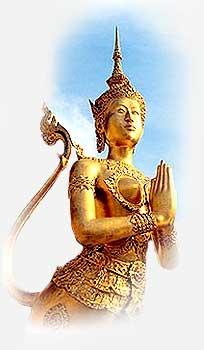Prime Minister Surayud Chulanont stated that Dhamma helped achieve good governance and development in the modern world and that the teachings of the Buddha could guide people to a peaceful and just society.
The Prime Minister made the statement in his opening remarks at the Fourth International Buddhist Conference on May 27 at the United Nations Conference Center in Bangkok. The conference marks the celebrations of the International United Nations Day of Vesak.
In his remarks, the Prime Minister said that the theme of this conference “Buddhist Contribution to Good Governance and Development” is a topic of interest not only for Buddhists, but also for the whole world. According to his observations, the concept of governance is as old as human civilization. Good governance is neither Buddhist nor non-Buddhist in character. It is the common interest of everyone and of all civilizations.
He cited as an example the concept of chakka-vatti in the Pali scriptures, saying that this concept appears as a global righteous ruler who rules through dhamma for the people. Good governance is an ideal that is difficult to achieve in its totality. However, many countries, including Thailand, are making efforts towards this ideal.
Prime Minister Surayud said that over the centuries, the teachings of the Buddha on the law of karma, have had an enormous influence on the culture and life of the Thai people. In the late 13th and 14th century, King Ramkhamhaeng the Great, one of Thailand’s most able rulers, began to build a society based on dhamma. Following the model of the Buddhist Emperor Asoka of India, King Ramkhamhaeng strove to ensure a peaceful and just kingdom. Respect for individuals’ rights, concern for the people’s welfare, transparency, people’s participation, and efficiency – things that are now considered to be the hallmarks of good governance – were characteristics of governance under King Ramkhamhaeng. It is recorded that the King paid so much attention to people’s livelihoods that everyone was allowed to come and ring a bell, if they had a problem, and that the King would respond to the call.
The Prime Minister said that, with good governance under King Ramkhamheang’s reign, peace and development were realized. People achieved sufficiency characterized by the phrase: “There are fish in the water and there is rice in the fields.”
He said that good governance and the Buddha’s teachings have never been more relevant. Good governance nowadays encompasses corporate governance, local governance, national governance, and international governance. It is intimately involved with decision-making and the process through which decisions are implemented. Only could we ensure development in every sphere of life for the people, for good governance, peace and development are interlinked.
The Prime Minister pointed out that, with a peaceful heart, peaceful actions would become a real possibility for individuals and for a peaceful society at large. The Five Precepts, which are the basic moral codes, emphasize the respect for life, property and family; responsible speech; and mindful consumption of food and drinks. A just society is also one in which there is no divine right for one group over another, all are considered equal in terms of the law of karma.
news research by ven.phramasrithont Director Information Technology
Source form : http://thailand.prd.go.th/view_inside.php?id=1960 |







